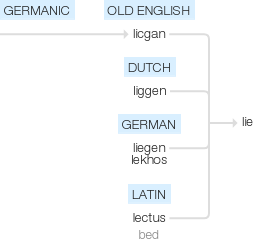Lie
Old English licgan, of Germanic origin; related to Dutch liggen and German liegen, from an Indo-European root shared by Greek lektron, lekhos and Latin lectus ‘bed’.
wiktionary
From Middle English lien, liggen, from Old English liċġan, from Proto-West Germanic *liggjan, from Proto-Germanic *ligjaną, from Proto-Indo-European *legʰ-.
Cognate with West Frisian lizze, Dutch liggen, German liegen, Danish and Norwegian Bokmål ligge, Swedish ligga, Icelandic, Faroese and Norwegian Nynorsk liggja, Gothic 𐌻𐌹𐌲𐌰𐌽( ligan); and with Latin lectus(“bed”), Irish luighe, Russian лежа́ть(ležátʹ), Albanian lag(“troop, band, encampment”).
As a noun for position, the noun has the same etymology above as the verb.
From Middle English lien(“to lie, tell a falsehood”), from Old English lēogan(“to lie”), from Proto-West Germanic *leugan, from Proto-Germanic *leuganą(“to lie”), from Proto-Indo-European *lewgʰ-(“to lie, swear, bemoan”).
Cognate with West Frisian lige(“to lie”), Low German legen, lögen(“to lie”), Dutch liegen(“to lie”), German lügen(“to lie”), Norwegian ljuge/ lyge(“to lie”), Danish lyve(“to lie”), Swedish ljuga(“to lie”), and more distantly with Bulgarian лъжа(lǎža, “to lie”), Russian лгать(lgatʹ, “to lie”), ложь(ložʹ, “falsehood”).
From Middle English lie, from Old English lyġe(“lie, falsehood”), from Proto-Germanic *lugiz(“lie, falsehood”), from Proto-Indo-European *lewgʰ-(“to tell lies, swear, complain”). Cognate with Old Saxon luggi(“a lie”), Old High German lugī, lugin(“a lie”) (German Lüge), Danish løgn(“a lie”), Bulgarian лъжа́(lǎžá, “а lie”), Russian ложь(ložʹ, “а lie”).
etymonline
lie (v.1)
"speak falsely, tell an untruth for the purpose of misleading," late 12c., from Old English legan, ligan, earlier leogan "deceive, belie, betray" (class II strong verb; past tense leag, past participle logen), from Proto-Germanic *leuganan (source also of Old Norse ljuga, Danish lyve, Old Frisian liaga, Old Saxon and Old High German liogan, German lügen, Gothic liugan), a word of uncertain etymology, with possible cognates in Old Church Slavonic lugati, Russian luigatĭ; not found in Latin, Greek, or Sanskrit. Emphatic lie through (one's) teeth is from 1940s.
lie (v.2)
"rest horizontally, be in a recumbent position," early 12c., from Old English licgan (class V strong verb; past tense læg, past participle legen) "be situated, have a specific position; remain; be at rest, lie down," from Proto-Germanic *legjan (source also of Old Norse liggja, Old Saxon liggian, Old Frisian lidzia, Middle Dutch ligghen, Dutch liggen, Old High German ligen, German liegen, Gothic ligan "to lie"), from PIE root *legh- "to lie down, lay."
Especially "to lie in bed," hence often with sexual implications, as in lie with "have sexual intercourse" (c. 1300), and compare Old English licgan mid "cohabit with." To lie in "be brought to childbed" is from mid-15c. To lie to at sea is to come to a standstill. To take (something) lying down "receive passively, receive with abject submission" is from 1854.
lie (n.1)
"an untruth; conscious and intentional falsehood, false statement made with intent to deceive," Old English lyge, lige "lie, falsehood," from Proto-Germanic *lugiz (source also of Old Norse lygi, Danish løgn, Old Frisian leyne (fem.), Dutch leugen (fem.), Old High German lugi, German Lüge, Gothic liugn "a lie"), from the root of lie (v.1).
To give the lie to "accuse directly of lying" is attested from 1590s. Lie-detector is recorded by 1909.
In mod. use, the word is normally a violent expression of moral reprobation, which in polite conversation tends to be avoided, the synonyms falsehood and untruth being often substituted as relatively euphemistic. [OED]
lie (n.2)
"manner of lying, relative position," 1690s, from lie (v.2). Sense in golf is from 1857.
